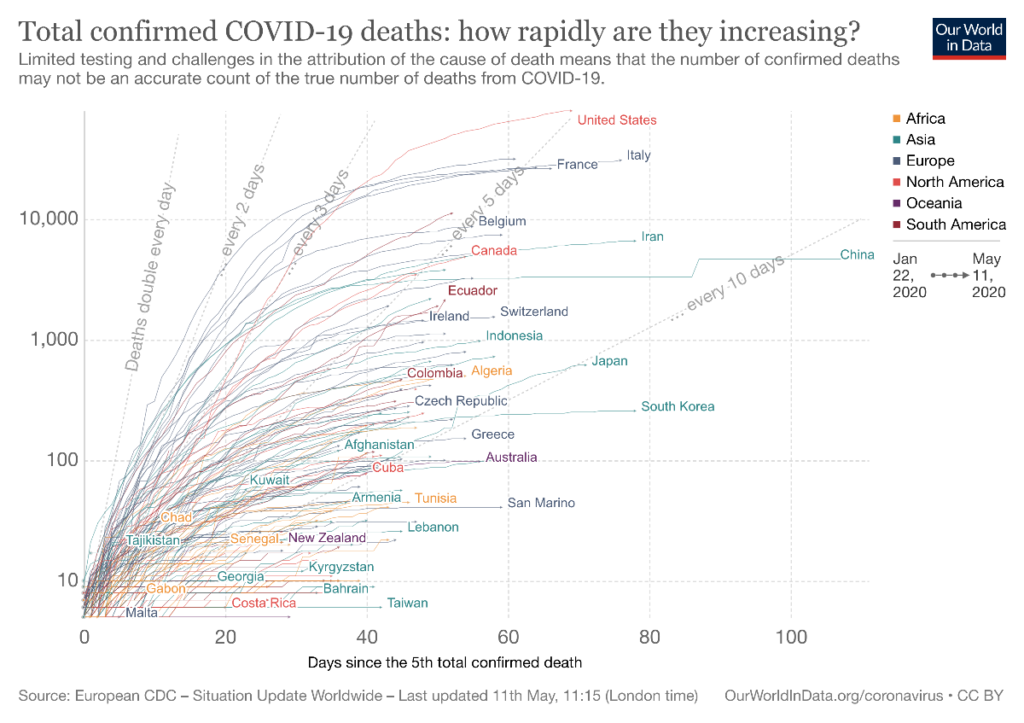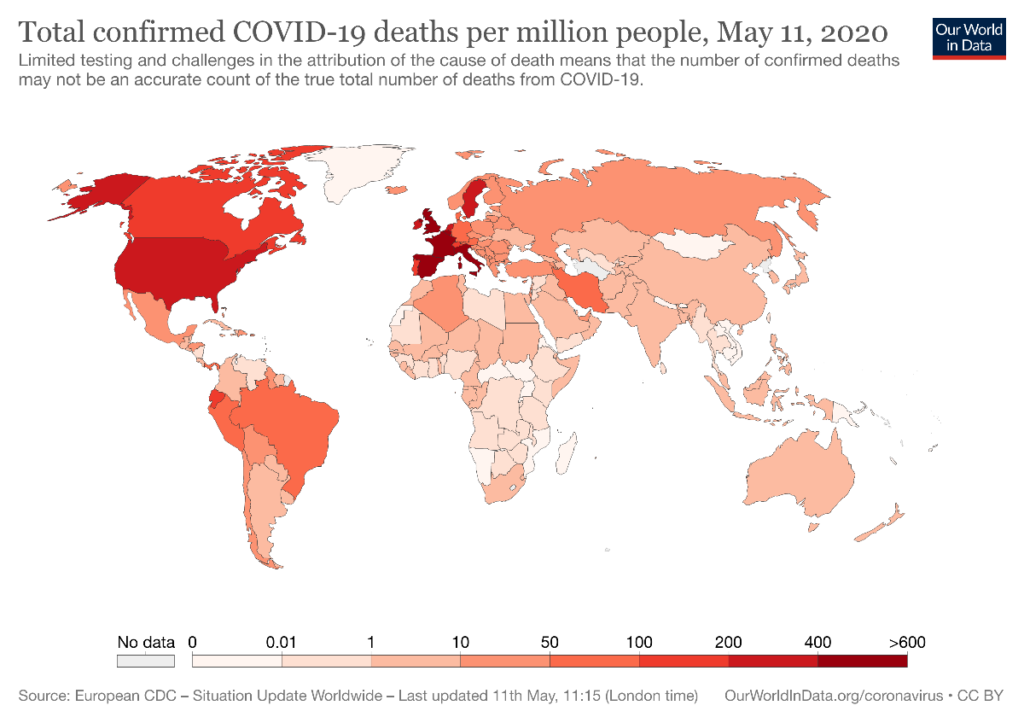Published: 05/12/2020
Dear Global Health Colleagues,
This issue of our COVID-19 newsletter reflects the Center for Innovation in Global Health’s commitment to elevate the pandemic’s impact on vulnerable communities. From homeless populations in the US to those facing food insecurity, we hope the curated resources help to shine a light on the unique problems faced by underserved populations. We have also included a few particularly interesting event invitations and we hope that you can make time for the WomenLift Health Speaker Series on May 14 and the Stanford International COVID-19 Conference on May 15.
In response to the COVID-19 pandemic, our Center put out a call for proposals that will help curb the pandemic in under-resourced settings. We are pleased to announce the five winners! The winning projects will:
– Develop a low-cost device that can disinfect N95 masks using heat and humidity
– Design an affordable and portable antibody assay that can detect COVID-19 specific antibodies and correlate them with viral load
– Rapidly develop guidelines to evaluate and decontaminate PPE, with trials in Bangladesh and Ethiopia
– Assess COVID-19 health-seeking behavior in the Urban Slums in Mumbai, India
– Develop a new sampling methodology that can forecast the future trajectory of the pandemic in vulnerable populations in California.
Read more about the winners and their projects:
In solidarity against COVID-19,
Michele Barry
Drs. Ben and A. Jess Shenson Professor of Medicine and Tropical Diseases
Director of the Center for Innovation in Global Health
Senior Associate Dean for Global Health, Stanford University


Continue to monitor the following reliable websites for the global situation:
NIH/NLM | LitCovid—–LitCovid is a curated literature hub for tracking up-to-date scientific information about the 2019 novel Coronavirus. It is the most comprehensive resource on the subject, providing a central access to relevant articles in PubMed. The articles are updated daily and are further categorized by different research topics and geographic locations for improved access.
Resources
Global Trends and Topics
Preparing for COVID-19 in Low- and Middle-Income Countries: Leveraging U.S. Global Health Assets (4/24/2020): This update to an earlier analysis includes tables that show the latest case numbers and identifies the most recent list of countries receiving COVID-19 assistance from the US.
Critical care capacity during the COVID-19 pandemic: Global availability of intensive care beds (4/23/20): This paper by Dominque Vervoort and Xiya Ma is the first to map global ICU bed capacity and sheds light on the need to increase ICU bed capacity during the COVID-19 Pandemic.
COVID-19 could exacerbate food insecurity around the world, Stanford expert warns (5/5/2020): In this article, David Lobell, director of Stanford’s Center on Food Security and the Environment, outlines likely scenarios and possible solutions for food insecurity in the wake of COVID-19.
Regional News
Covid-19 and sub-Saharan Africa’s critical care infrastructure (4/23/20): This opinion piece by Edgar Asiimwe and Saraswati Kache from Stanford describes the lack of ICU capacity that is critical to managing COVID-19 in the sub-Saharan region of Africa.
Limiting the spread of COVID-19 in Africa: one size mitigation strategies do not fit all countries (4/28/20): This comment by Shaheen Mehtar et al. provides an overview of various COVID-19 mitigation strategies in African countries.
South America prepares for the impact of COVID-19 (4/29/20): This paper by Tony Kirby provides information about the impact of COVID-19 in South America, particularly in Brazil.
COVID-19: Shining the Light on Africa (5/5/20): This editorial, authored by ASTMH and global health leaders, focuses on priorities in combating COVID-19 in African countries.
Domestic Underserved Populations and Health Disparities
Prisons are “in no way equipped” to deal with COVID-19 (5/2/20): Author Talha Burki reports on why prisons are hotspots for the spread of COVID-19 and the lack of adequate preparation in prisons worldwide.
COVID-19 Outbreak Among Three Affiliated Homeless Service Sites — King County, Washington, 2020 (5/1/20): This study by Farrell et al. describes CDC and local public health response to COVID-19 outbreak in 3 homeless shelters in King County, WA serving people >=50, where mass testing was conducted at 2 time points.
Assessment of SARS-CoV-2 Infection Prevalence in Homeless Shelters – Four U.S. Cities, March 27–April 15, 2020 (5/1/20): This study by Emily Mosites et al. showcases screening efforts in 19 homeless shelters in 4 cities (Boston, San Francisco, Seattle, Atlanta), where 1192 residents and 313 staff were tested.
Notes from the field: South Africa

Notes from Dr. Feyisayo Odunitan-Wayas, NIH Global Health Equity Scholars LMIC Fellow at University of Cape Town, South Africa
The triple burden of obesity and Non Communicable Diseases, food insecurity and physical inactivity in South Africa, especially in women and children, is likely to be exacerbated by the consequences of the national lockdown measures which significantly restrict movement. Staggering loss of livelihoods especially for the urban poor, who are mostly employed in the informal sector, seems inevitable. These will undoubtedly further impact their ability to afford sufficient and healthy foods.
Women who have young children are unable to leave their children unattended in order to get much needed physical activity outdoors during the stipulated period from 6am-9pm. Many who are housebound are unable to be physically active in their cramped living conditions. More family bonding time which may have seemed favourable in the first weeks of the national lockdown is now presumably resented, especially by those who are out of work, or those with young children who are often hungry and physically inactive. Consequently, impatience and frustration are mounting, which has the likelihood of increasing rates of domestic violence, anxiety and depression.

Without a doubt, South Africans are going to be hit hard by the COVID-19 crisis, despite the relief package released by the government. The government has clearly indicated they do not have the capacity to fully address household food insecurity by itself and physical activity seems not to be a priority. Presumably, the urban poor, South Africans and African immigrants are going to be the hardest hit, with little or no social welfare net, having little hope of benefiting from the relief package based on the eligibility criteria and the alleged misappropriation of the limited funds and food parcels.
It seems inevitable that income inequality of South Africa is going to become wider and the hungry will become hungrier, resulting in their defying the necessary social distancing measures in order to get food. The significance of the community and NGOs such as food banks and faith-based organizations during this crisis cannot be overlooked as they have stepped forward to try and bridge the widening incapacity of the government to feed the food insecure.
Upcoming Events and Lectures
Friday, May 15, 2020, 7:45 AM – 1:15 PM (PT)
International COVID-19 Conference at Stanford, led by the Asian Center for Health Research and Education and co-sponsored by the Center for Innovation in Global Health
In the wake of the COVID-19 pandemic, leading experts have come together across disciplinary and national borders to address urgent public health needs, share vital data and research, and provide critical medical care.
We invite you to join us as we hear from these experts at the International COVID-19 Conference. This virtual and multi-disciplinary conference will bring together public health officials, researchers, and physicians to share COVID information, discoveries, and stories. Together, we endeavor to increase knowledge, empower education, and positively impact our response to this pandemic.
Co-sponsored with the Center for Asian Health Research and Education, the Center for Population Health Sciences, the Center for Innovation in Global Health and the Center for Digital Health.
Thursday, May 14, 2020 at 8:30 AM (PT)
WomenLift Health Virtual Speaker Series: Gender and Power in COVID-19
Hear from Dr. Geeta Tao Gupta, a Senior Fellow at the United Nations Foundation and Executive Director of the 3D Program for Girls and Women, Gautam Bhan, Senior Lead, Academics & Research, Indian Institute for Human Settlements and Dr. Laura Alfers, Director, Social Protection Programme, Women in Informal Employment: Globalizing and Organizing (WIEGO) as they participate in a discussion on “When the Overlooked Workforce Becomes the Essential Workforce”.
Nearly two billion people across the world work in the informal economy. From nannies in New York to street vendors in Delhi to cleaners in Nairobi, these are jobs that tend to lack labor protections or government benefits, putting workers at financial and physical risk. Women are far more likely than men to be employed by jobs in this sector, impacting their health, safety, and job security when disasters or emergencies strike. COVID-19 is no exception. While the informal labor force helps to keep the world running as the pandemic takes its toll, the needs of those working these jobs – often deemed ‘essential’ – have been dismissed or sidelined. Now more than ever we must ensure informal workers have a platform to share their stories and that COVID-19 responses take their needs into account.
New Funding Opportunities Specific to COVID-19
Online List of COVID-19 Research Opportunities
Stanford’s Research Management Group has created a website that provides a complete listing of funding opportunities for COVID-19 research. The site also provides sponsor and University guidance on grants, clinical trials, and award management impacted by COVID-19.